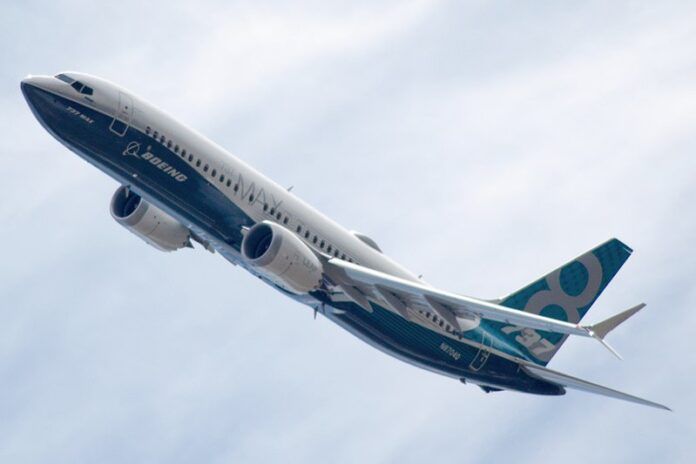Non-pilots may be hard to deal with, but we all must interact with them from time to time, and this was my time. I was pickleballing at the local pickleballing venue with a group of tottering and doddering old friends. We were staying out of the kitchen and, because of our advanced age, found ourselves taking water and rest breaks far more often than our younger pickleballing counterparts.
This aging pilot was sitting in the shade, minding my own business, when one of the non-pilot pickleballing geezers approached me with an open question.
“How about that Boeing, huh?” he said.
What about that Boeing? I volleyed back at him.
“They keep falling apart!” he said, adding, “Hah!” as if that summed up the whole thing and that we could then bond over potential aviation fatalities and the frailties and failures of the aviation world.
I sent back a lob.
What do you mean? I asked. Is something going on with Boeing Aircraft?
“You know,” he returned, “that hole in that Alaskan airplane that blew out of the side and all the other stuff recently, like wheels falling off and jets landing in the mud. You’ll never see me flying in a Boeing again!”
Oh, I said. I remember now. Yes, big chunks of any airplane falling off in flight are a cause for concern. It is a problem, but I don’t know if this recent spate of cable and network news kerfuffles is a reason not to go flying.
It is true that having a large panel of an airplane fly off in flight is a serious thing. Everybody, including me, must wonder if Boeing missed bolting that piece correctly and what else they missed when building the jet. Then again, the other things like wheels falling off and sliding into the mud at the airport are due to maintenance and piloting, not the kind of airplane it happened to.
“Well,” he said, “it all shows you how corrupt the airline and airplane business are. Didn’t you fly Boeings back when you were a pilot?”
I reminded my pickleballing buddy that I am still a pilot—I went flying just a few hours ago in my mighty Cessna 140—but I got what he meant.
Yes, I said, I flew just about every Boeing model, from the 727 to the 777, and I only missed piloting the 737.
“They were better made back then, right?” he said.
I’m not sure, I said. The ones I flew worked adequately most of the time, but back then, a part or a piece of them occasionally departed the airframe and dropped to the ground.
A toilet service door that was not properly latched wiggled off once on my plane, and I remember a nosewheel gear door on a 727 I was a flight engineer on departing the airframe in cruise one time. I don’t think that either one of those things was due to corporate greed or malfeasance. Most likely, the ones that happened to me were because of wear and tear or, at worst, lazy ground crews or lapses in maintenance.
The thing is, and this is hard for me to admit, I am not an expert on the manufacture or maintenance of jet transport aircraft. I basically flew the planes that were presented to me, and my responsibility was to refuse to fly the ones I thought were not airworthy.
There were a few cases where I turned down airplanes, but they were few and far between and never because of perceived manufacturing flaws.
Currently, Boeing is the large fish floundering in a tiny media barrel. It is their turn for close scrutiny, and they deserve it. Their upper management may have cut too many corners to secure their obscene pay packages. It is possible that the company lost sight of something or other. Most companies do that at one point or another.
I do know this: Nobody at Boeing wanted any of these bad things to happen to their company, the airplanes they made, or their reputation. Countless company employees go to work every day and do their absolute best to do a safe and efficient job.
It could be that their “perfumed princes,” the overpaid corporate MBA types, became greedy, and their ignorance of aviation standards led to death and destruction, but the large majority of real Boeing people are mortified by this whole thing.
As bad as the Boeing 737 disasters were and are, you can bet your pickleball bag that this sort of thing has happened before in aviation and is in the process of happening elsewhere. Maybe the best thing about it all is that our media, hyped as it is, has drawn the public’s attention to the fact that aviation safety isn’t guaranteed. It must be worked on every day.
Find out about me here: https://www.linkedin.com/in/kevng/



































A good post but maybe 6 months too soon? It will be a long and painful haul to re-establish a trustworthy base for this once grand company. You’ve got to get the basics right which means all the folks from the janitor up need to want this to succeed. Osmosis, faith and trust from the ground up. Still need to clear out the bad vapours.
As we used to say in the military … “All it takes is one ‘aw-shit’ to erase 1,000 attaboys.”
Yes, I heard that in my ’70’s Army days. Still works.
I don’t think six months is enough time for Boeing to turn around. Their problems are literally decades in the making, and may take just as long to resolve.
A similar thing happened to Toyota in the early 2000s. They had their own engineers “finishing school”. They would take new engineers and then train them to “Toyota” standards. This typically resulted in the high quality and reliability that people have come to associate with their cars. But in the early 2000s Toyota embarked on a drive to expand and cut costs. To get the larger number of needed engineers faster they short-cut their internal training programs. These new engineers didn’t design things quite up to the old Toyota standards. But what they worked on would often take 7-8 years to make it into production. The result was the huge wave of Toyota recalls in 2009-2010.
It seems Boeing is going through a similar wave, and it’ll take many years to get out of it.
I know more than the average media-besotted Joe about a number of topics (don’t get me started on AI). When presented with a well-meaning conversation-starter such as this, by someone who doesn’t appear to have any expertise (or axe to grind), I respond, “Yeah, that’s something else, for sure.” Then deftly pivot to, “So who do you think is going to take the women’s Final Four?” That usually puts us both on comparable levels of ignorance, and we can proceed to speculate without any expertise getting in the way.
Yeah, but I had to come up with a construct to start the conversation. I write about the women’s final four in my newspaper column. best, kg
I thought it an excellent commentary, well written and humorous. Some times the head gets so far away from the feet they can’t see each other. Especially if there’s a big belly blocking the view.
As a retired A&P, the author is correct about the recent spate of incidents occurring because of maintenance and/or piloting. I’ve said for a while that Boeing’s beancounters and lawyers need to be removed and bring in the engineering talent to run the company. I personally have no problem flying on Boeing aircraft even the 737 MAX. Our esteemed “media” is ignorant, glad to be so, and usually haven’t a clue on anything technically oriented whether aircraft, cars, or firearms.
This sounds really naive, but what if executive compensation was tied to the performance of the aircraft and a clean safety record instead of “enhancing shareholder value?”
Mr G;
Quote
performance of the aircraft and a clean safety record instead of “enhancing shareholder value?”
End Quote
These are the same thing. I can’t imagine Boeing’s CAP has improved lately – in fact it continues to decline steadily. Fortunately it has historically been a stock not for the punters. The folks who invest in or gamble with Boeing stock are wiser than the great unwashed, but not immune. This also makes prioritizing the shareholder not only easier than other companies, but more essential.
Negative stories in the media will always negatively impact shareholder value – especially when followed up by other negative reports that then create a media feeding frenzy. If anyone thinks any of this is because of a focus on shareholder value ( to the detriment of product performance) that person isn’t looking very closely – or rationally.
In virtually every corporation the product performance comes first. Cost cutting and efficiency measures must always happen. But no corporate board can ignore actual production.
Over the long term, you’re absolutely correct. The trouble comes with the leadership “ebbs and flows” that we humans perpetrate in shorter time periods. Leadership at Boeing appears to have allowed the delicate balance between profit and quality to swing to the profit side of the pendulum for far too long, and we’re seeing the results. It’s happened at nearly every company that’s grown significantly, gone public, and/or experienced turnover in leadership. Some correct and some go broke. Fortunately for Boeing, the US Military’s billions all but preclude the going broke eventuality, so with apologies for the pun, they have “plenty of runway.”
“Naive?” How so?
I could be wrong, but he may mean that engineers are about as qualified to be CFOs & CLOs as said Chiefs are to be engineers of complex aircraft.
“Maybe the best thing about it all is that our media, hyped as it is, has drawn the public’s attention to the fact that aviation safety isn’t guaranteed. It must be worked on every day.”
Exactly! After MCAS and its associated coverup, a lack of inspections or records of inspections resulting in missing/loose bolts, and the months long grounding of the 787 due to battery fires, the public (paying passengers) is right in questioning the safety of Boeing aircraft even if they don’t fully understand the problem, which is beancounters don’t work on aviation safety every day, they work on quarterly profits every day.
The “piling on” by the nincompoops of media goes beyond the usual rhetoric regarding Boeing. It makes a person wonder what the real motives are? Scare people away from airline travel, those flying machines that produce plant food (aka CO2) and chemtrails (aka ice crystals) ? Or is it retribution for Boeing having chosen a union-free state (SC) over a union-dominated state (WA) for the B787 production? Especially given that Boeing recently moved its HQ from woke Chicago to the wokest Swamp in America, the D.C. area? My own experience working with Boeing engineers was outstanding. I’ve also worked with Airbus, Embraer and others, and still regard Boeing engineers as the brightest and most conscientious in a field where ethics still remain very strong among engineers. The few problems that have been cited in recent months are examples of poor pilotage (bad sticks), faulty maintenance, and the usual issues with weather, FOD, etc. Look at the number of cycles these magnificent aircraft are subjected to and it is remarkable how infrequent problems truly are. For the chicken-littles out there, I can assure you the pilots prefer you to stay on the ground anyway. Guess who gets it first when things go South?
The “Chicken Little” types usually claim “THE SKY IS FALLING!”–and the even LITTLER CHICKENS respond with “THE UNIVERSE IS IMPLODING!” All because some “good ol’ boy” on a maintenance or production line didn’t do his/her job correctly.
The doomsayers blame EVERYBODY–“it must be the fault of the company President or his stable of evildoers”. Does anyone even think that corporate higher-ups were even AWARE of the faulty inspection (or ordered it “covered up”?).
These “chicken little” types are usually the same people that will opine on how dangerous “little airplanes” are while driving on roads and (usually) missing other vehicles by inches. “Yep–couldn’t get ME on one of those things!” Our aviation system is an order of magnitude safer than driving cars–but you don’t see the “sky is falling” types demanding that our CARS stay in the garage.
Now if the AIRCREWS start refusing to fly the airplanes, perhaps THEN we should take notice. In the meantime, I’ll continue to enjoy flying–it’s safer than driving.
Former Boeing design engineer here (1980 – 2000), who lived through the engineer’s strike in 2000. The primary reason the company (and Harry Stonecipher) compromised on the contract ending the strike was because the DER’s also walked out, and the company couldn’t process significant designs until they were approved by the non-management FAA reps. Engineering needs to grow up and return to those design standards, and that turnaround could happen quickly given the proper attitude.
Another significant course-correct should be implemented with the manufacturing union in Seattle (IAM). They currently sign off on the work and the verification, but they also own the QA process on the factory floor. Until that “hold accountable” department is returned to an independent organization, we will continue to see obscuration of the build process (“Sorry, we can’t find the signatures or identify the folks who did this shoddy work”).
Still, I appreciate the pilot author’s perspective on this, and agree with many of his sentiments. The piling-on mentality of the press is another form of corporate greed too: it sells clicks. Stuff happens. Learn from it, improve the process, and move on.
“Ferris”–you nailed it! The old adage of “Trust–but VERIFY” is appropriate here. More than any other industry I know, the aviation business is built on trust–from parts manufacturers to airframe assemblers to mechanics to pilots (and yes, administrative staff)–all must have trust that the job was completed correctly–but then there is that “VERIFY” thing.
The aviation industry is perhaps the safest in the world because of that interaction of “trust–but verify model. If there is a problem–seek the source–but don’t condemn the entire company or industry.
This entire media-created “dustup” reminds me of the old adage of “The 6 stages of a project.”
1. Enthusiasm
2. Dissillusionment
3. Panic
4. Search for the Guilty
5. Punishment of the Innocent
6. Praise and Honors for the non-participants.
I’d say we are between Stage 5&6 right now.
As Ferris so well stated–“Stuff happens. Learn from it, improve the process, and move on.”
Thanks for your more eloquent summary, Jim. Well spoken and I heartily endorse your sentiments!
In the 1970’s I delivered around 50 brand new Mooneys from Kerrville, Texas to Europe and Australia and agree that management arrogance and greed resulted in my being handed the keys to many unairworthy aircraft. Indeed, one aircraft I delivered to Sweden crashed and killed the occupants and 3 months later I had an engine failure mid North Atlantic in December. In both cases an oil line crankcase elbow installed incorrectly by Mooney, broke off. Two out of fifty is a pretty high failure rate and must have been the going rate because that is when manufacturers liability insurance went into the $200,000’s per aircraft ! Didn’t stop me from flying as I still fly my Lake Buccaneer under Basic Med at age 83.
Wow, that is a ton of Mooneys. Did you ditch in the North Atlantic? I was a junior/senior high school guy back then, and my gig was ferrying (I think 12) new Cessnas back from ICT to LAL. It was a great education for me, and sometimes, I wonder how I survived, but it beat going to school and was safer. There was lots of racial violence going on back then in Lakeland Senior High in FL.
I knew we could count on Kevin for an rational, unvarnished take on the Boeing situation and as usual he did not disappoint.
Kent M’s comment about retribution towards Boeing for moving production to SC made me wonder if Airbus has faced the same response (assuming Boeing ever did). Airbus builds the A320 series in Mobile AL, which is a low union participation state.
Thanks Will
My instrument instructor was an old FAA pilot, DC3 etc., who checked the instrument installations in Alaska when it was still a territory. Talk about skills. But he would agree with Larry S.; “All it takes is one ‘aw-shit’ to erase 1,000 attaboys.” Guys like him made possible what we enjoy today but since Regan there have been almost no attaboys, or girls either. Bad morale does not improve things. The MSM is always hard on any single government failure and the fringe media make everything a failure. Neither has time for an atta. This is a recipe of continuing failure.
Not since the ’70’s in Alaska have I filled 3 passenger seats for a random sightseeing flight, just work or trips. For work someone usually went by surface, usually driving. Just stupid, stupid, stupid. But I repeat mysel.
Yep. You can fly safely your whole life, but if you crash just once and kill 300 people you are always and only referred to as that guy who killed those 300 people…
Agree with much of what you say- but the Max debacle still is an issue for me – it wasn’t just the MBA perfume princess, but also the salespeople who sold the Max to these airlines and were basically arrogant a-holes. It was a cultural shit show that a lot of people were powerless to fight but some that embraced it too-
BTW your LinkedIn profile is about the best I’ve read in a long time 🙂
Thank you! Much of it is accurate! kg
The article posted by Mr. Kevin Garrison is, in my own opinion (IMOO and not in IMHO) one of the best articles I’ve read in AVweb (and I here include Mr. P. Bertorelli, that a lot of people consider the “god” of aviation columnists).
And I don’t care, AT ALL, the replies I predict that will be posted to this comment.
Thank you for your kind words. Paul may be a god, but I only aspire to be a lowly (and hopefully high-paid) demon. kg
Good write-up Kevin. Here’s my take; I recognized Boeing as a national asset and as a key player in the global aerospace industry, but Boeing is in a pickle.
Now, Boeing’s significant contributions to the U.S. economy and its central role in national defense through military contracts are undeniable. Yet, recent years have brought a series of operational, financial, and ethical challenges to the forefront, amplified by media scrutiny, competition, naysayers, the hopeless, and the hysterical hypochondriacs.
I also believe, from work experience, that it’s important to appreciate the heart and soul of Boeing: its workforce. And, that the majority of Boeing employees are not just responsible; they are deeply committed to the company’s mission and to upholding the highest standards of safety and innovation.
However, we must confront the reality of the situation. Boeing has displayed what can only be described as a pattern of sloppiness in its operations and oversight, contributing to a tarnished reputation and a loss of trust within industry and among the public. These are not mere blips in performance but signs of deeper systemic issues that require urgent attention and remediation. It’s been going on for too long. It has to stop.
Critics and the media have been quick to highlight these failings, often overshadowing the efforts of thousands of Boeing employees working tirelessly to support the company’s legacy of excellence. While scrutiny is necessary, the debate often lacks a constructive approach, focusing more on censure than on solutions that could help Boeing emerge stronger from its current predicaments.
Demon Garrison has a catchy ring to it… Boeing needs to follow the tried and true remedy of letting go their most junior employees and hire more managers to fix this. (tongue firmly stuck in cheek)
I was a passenger on an Airbus A340 from Manila to LAX and when the sun came up I saw an open inspection panel on #2 cowling. By comparison to the Boeing frenzy, this was an incident but upon landing the aircraft stopped short and a mechanic came out with a stepladder and installed some screws. Technically, because the aircraft was a Philippine registered aircraft it was up to the Philippine authority to follow up. Had the plane reached the gate then the FAA would have had purview.
It’s not a plug blowing off, but you get the point. This popular public crucifixion of Boeing is ill deserved. Airbus has actually had more crashes than Boeing, yet the public seems to ignore the reality.
The importance of maintenance over manufacture hit home on a flight in Peru. I was flying (as a passenger) out of Cajamarca, high in the Andes (9,022 ft), in a bowl surrounded by even higher mountains. The ticket showed the equipment as a Fokker (50 or similar) and I wasn’t too worried but when we boarded it was a big, battered, old Russian turboprop with a bulkhead in front of the passengers for a cargo section under the wing and a big side door for loading cargo. I was a bit nervous. They put just enough fuel on to take off, circle the valley while climbing to clear the ridge and glide down to Trujillo and take on more fuel for the flight to Lima. It was and uneventful flight. Next to us on the ramp in Trujillo, which I could see through the open cargo door was a Boeing 737. I’d left an engineering job at Boeing about 10 years earlier and its reputation was untarnished at the time (pre-merger). The 737 fired up, started to move, then shut down. A maintenance guy came out with a ladder, a funnel, and some oil opened the cowling and put some oil in the engine. I’ve got over a million miles with the airlines and have never noticed anyone putting oil in the engines before or since, but that day I realized it was the maintenance that mattered.
As a aviation research Ph.D. scientist who has to use objective measures in my studies e.g. fatal accident count, here’s my take- ONE fatal accident involving US air carriers (aka airline hauling paying passengers) in FOURTEEEN years and that was in 2010. ‘Nuff said.
Couldn’t agree more with Kevin!
As a retired 747 Captain and Air Ambulance pilot, most of the problems Boeing has encountered, have been the result of DEI in the airlines!
DEI? Well, I guess that if one were to interpret the mention of age and the interaction across generational lines within the pickleball context as touching upon “inclusion”, it would be in a very limited and indirect sense, focusing on age “diversity” and potentially the inclusion of older individuals in social activities and conversations about aviation safety and industry practices.
As a management consultant to the aerospace and automotive industries for most of my career, I’ve developed a perspective that nobody wants to hear. And yes, Boeing was my customer several times. In the ‘80s, my clients were grizzly engineers who were selected for promotion based on their abilities. Many served in WWII, Korea and Vietnam and had seen a thing or two. The first sign of looming problems was a transition from leadership with engineering background to leadership with financial backgrounds and MBAs. In the ‘80’s, cost was an equal tradeoff criterion with other decision criteria. In the 90’s I started seeing a transition to cost being a dominant evaluation criterion. The second sign was the lack of serious engineering, manufacturing or operations knowledge. I would interact with senior leaders of these industrial companies, and many did not know how to tighten a screw or a bolt. Total lack of mechanical knowledge. The third sign was the decay of meritocracy. The criteria for promotion evolved into the people who could best manage the corporate politics. I’ve worked with great engineers and poor engineers. Let me tell, you want to be flying an aircraft produced by great engineers, NOT mediocre engineers.
Leadership with no engineering background has crept down to the lower levels. People who got technical degrees but have no desire to be engineers can now work their way into engineering management by working on their career instead of their job. There is also a problem with inability to gain significant experience. In the 1980’s, the old timers had spent their careers going from one new project to another and might have worked on a half dozen new designs. Now, military programs seem to get stretched out forever to decrease the budget per year.
Dana and Robert, while there are many interesting and valid aspects to these comments, you are displaying the drill down to root cause and root reason of problem resolution and prevention that in my day, was already lost. The rest of the back and forth is a textbook example of an inability for critical thinking, among other less flattering characteristics, that is used to distract so often that, it is now it’s own form of acceptable rhetoric. De-evolution is here.
Good, fair article. Too many media outlets these days with space to fill.
Now that all the comments are in, my thoughts:
– Boeing moved to DC to enhance its lobbying, not to be “more woke”. Defense funding (our tax dollars) provides way more revenue than airliners.
– A comment about DEI just shows your age. Young people today consider it a factor on what company they’ll work for. The average age of Boeing new hires is probably one third the average age of these readers.
– If the tire falling off wasn’t on video, we would never have heard about it.
– The good ol’ days of Boeing engineers as management had one or more serious crashes every year. Maybe the bean counter management is helping safety after all. Maybe.